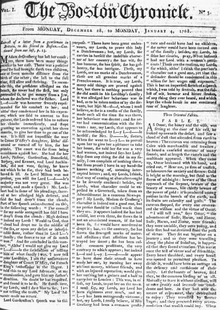The Boston Chronicle: Difference between revisions
No edit summary |
|||
| Line 1: | Line 1: | ||
====Date: [[:Category: | ====Date: [[:Category:1769|1769]]==== | ||
====Region: [[:Category:North America|North America]]==== | |||
====Subject: [[:Category:Political/Economic/Social Opinion|Political/Economic/Social Opinion]]==== | |||
====Medium: [[:Category:Print Journalism|Print Journalism]]==== | |||
====Medium: [[:Category:Print Journalism|Print Journalism | |||
---- | ---- | ||
[[File:BostonChronicle.png|left]] | |||
'''Artist:''' John Mein | '''Artist:''' John Mein (circa 18th century) | ||
'''Confronting Bodies:''' Colonial American patriots | '''Confronting Bodies:''' Colonial American patriots | ||
'''Date of Action:''' 1769 | |||
''' | |||
'''Location:''' Boston, Massachusetts Colony | '''Location:''' Boston, Massachusetts Colony | ||
'''Description of Artwork:''' Mein was a known loyalist. His letters caused an intense arguement between patriots and loyalists in colonial Massachusetts. <P> | '''Description of Artwork:''' Mein was a known loyalist. His letters caused an intense arguement between patriots and loyalists in colonial Massachusetts. <P> | ||
'''The Incident:''' Mein printed lists of names in the Boston Chronicle that accused colonial merchants of breaking a British nonimportation agreement. Mein's name appeared on a list of merchants who violated the trade agreement printed by a group of merchants. In response Mein published another letter accusing the Merchants' Committee of using the nonimportation agreement to lock out other merchants from trade, while they profited from the goods. The argument precipitated the ransacking of Mein's office, men who resembed him were beaten in the streets, and he was hanged in effigy. <P> | |||
'''The Incident:''' Mein printed lists of names in the Boston Chronicle that accused colonial merchants of breaking a British nonimportation agreement. Mein's name appeared on a list of merchants who violated the trade agreement printed by a group of merchants. In response Mein published another letter accusing the Merchants' Committee of using the nonimportation agreement to lock out other merchants from trade, while they profited from the goods. The argument precipitated | |||
'''Results of Incident:''' Mein left the colonies with 2000 pounds of debt and spent one year in debtor's prison in London. He continued writing for London newspapers against the patriot movement. In 1770, the Boston Chronicle closed.<P> | '''Results of Incident:''' Mein left the colonies with 2000 pounds of debt and spent one year in debtor's prison in London. He continued writing for London newspapers against the patriot movement. In 1770, the Boston Chronicle closed.<P> | ||
'''Source:''' Censorship, A World Encyclopedia, ed. D. Jones | '''Source:''' Censorship, A World Encyclopedia, ed. D. Jones | ||
[[Category:1769]] | |||
[[Category:1760s]] | |||
[[Category: | [[Category:18th century]] | ||
[[Category:North America]] | [[Category:North America]] | ||
[[Category:Political/Economic/Social Opinion]] | [[Category:Political/Economic/Social Opinion]] | ||
[[Category:Print Journalism]] | [[Category:Print Journalism]] | ||
[[Category:John Mein]] | [[Category:John Mein]] | ||
{{DISPLAYTITLE:<span style="font-style: italic;">The Boston Chronicle</span>}} | |||
{{DEFAULTSORT:Boston Chronicle, The}} | |||
__NOTOC__ | __NOTOC__ | ||
Latest revision as of 01:39, 17 January 2012
Date: 1769
Region: North America
Subject: Political/Economic/Social Opinion
Medium: Print Journalism
Artist: John Mein (circa 18th century)
Confronting Bodies: Colonial American patriots
Date of Action: 1769
Location: Boston, Massachusetts Colony
Description of Artwork: Mein was a known loyalist. His letters caused an intense arguement between patriots and loyalists in colonial Massachusetts.
The Incident: Mein printed lists of names in the Boston Chronicle that accused colonial merchants of breaking a British nonimportation agreement. Mein's name appeared on a list of merchants who violated the trade agreement printed by a group of merchants. In response Mein published another letter accusing the Merchants' Committee of using the nonimportation agreement to lock out other merchants from trade, while they profited from the goods. The argument precipitated the ransacking of Mein's office, men who resembed him were beaten in the streets, and he was hanged in effigy.
Results of Incident: Mein left the colonies with 2000 pounds of debt and spent one year in debtor's prison in London. He continued writing for London newspapers against the patriot movement. In 1770, the Boston Chronicle closed.
Source: Censorship, A World Encyclopedia, ed. D. Jones
